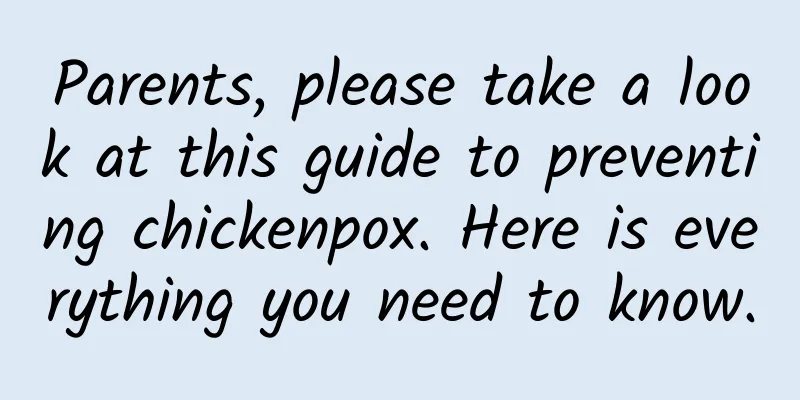Parents, please take a look at this guide to preventing chickenpox. Here is everything you need to know.

|
Chickenpox, which is feared by parents and school teachers, is an infectious disease that can occur all year round. It is especially common in winter and spring, which are considered the peak seasons for chickenpox. Many people know that children are the main susceptible group to chickenpox. Do you know why? What is Chickenpox? Chickenpox is an acute respiratory infectious disease caused by the primary infection of the varicella-zoster virus, with maculopapular rashes, herpes, and scabs on the skin and mucous membranes as the main manifestations. It is common in children and is mainly transmitted through respiratory droplets and contact, and the general population is susceptible. What are the reasons why children are susceptible to chickenpox? ◉ Children have weaker immunity Relatively speaking, children's immune systems are not yet fully developed, and their resistance is relatively weak. In addition, as children grow older and move around in a wider range, their chances of being attacked by pathogens gradually increase, making them more susceptible to infectious diseases such as chickenpox. ◉ Chickenpox is highly contagious Analysis over the past decade shows that varicella-related public health emergencies account for more than 20% of all infectious disease-related public health emergencies, and all of them occurred in kindergartens and schools. Chickenpox is commonly known as "transmission through encounters". Once a source of infection appears in places where children gather, such as daycare centers, primary and secondary schools, it can easily spread through droplet transmission (talking/coughing/sneezing, etc.) and direct contact (using public items, etc.). Chickenpox patients are the only source of infection of the disease. Before the rash appears, patients will have symptoms of upper respiratory tract infection such as fever, headache, sneezing, etc. They are highly contagious from 1-2 days before the onset of chickenpox until the blisters scab over, so you must pay attention to protection at all times. Are adults completely immune to chickenpox? Chickenpox is not just for children! Although chickenpox is common in teenagers, it is not exclusive to children. If adults are infected with chickenpox, the symptoms will be more severe than those of children, and the course of the disease will be longer. Pregnant women who get chickenpox may cause fetal malformations or miscarriage. Therefore, adults should also be careful about chickenpox. If you are unfortunately infected with chickenpox, it will affect your work for adults and your studies for teenagers, so prevention in advance is the key! What are the main measures to prevent chickenpox? 01 Get the varicella vaccine; the varicella vaccine can prevent 90% of varicella and is currently the most economical and effective measure to prevent varicella! 02 Keep the air flowing and avoid being in a confined space; 03 Take good personal hygiene protection, wash hands frequently, and avoid contact with cases; 04 Once infected with chickenpox, you should go home immediately for isolation and treatment to avoid the spread of the epidemic; 05 Disinfect the patient's supplies by sun exposure or boiling. What are the precautions for getting the chickenpox vaccine? Varicella vaccine is suitable for people who are susceptible to varicella aged 1 year and above. It is recommended for children of appropriate age, people with high risk of exposure or transmission, people who have close contact with high-risk and critically ill patients, and non-pregnant women of childbearing age. Routine vaccination program Children 14 years and under First dose: Children aged 12-24 months (one dose before kindergarten) Second dose: Children aged 4 to 6 years old (one dose after entering kindergarten) Those who fail to complete 2 doses as per the procedure should make up the 2 doses with an interval of 3 months between the vaccinations. People aged 14 and above: Administer 2 doses, with at least 4 weeks between the two doses. Emergency vaccination method Varicella vaccination within 5 days of contact with a varicella infected person can play a certain role in preventing the occurrence of varicella virus or reducing the severity of clinical symptoms. Note: In a family with many children, if a child is infected with chickenpox, he or she should stop returning to school and other children in the family should receive emergency vaccination as soon as possible. Vaccination channels The varicella vaccine can be administered at the vaccination clinics of township health centers, community health service centers, and some second-level and above hospitals. Tips: Varicella vaccine is not a vaccine in the immunization program and needs to be voluntarily administered at one’s own expense! Do I need to get the chickenpox vaccine if I have had chickenpox before? What should the school and parents do if a child has chickenpox? Check out the correct answers to these questions below! People who have had chickenpox can develop lasting immunity, and the chance of reinfection is very small, so there is no need to get the chickenpox vaccine again. However, after chickenpox is cured, the virus in the body may not be completely eliminated, but "camp" in the ganglia of the body and lurk for a long time; as people age, when their immune function declines, the virus can be reactivated to cause herpes zoster. The incidence and severity of shingles increase with age, especially after the age of 50. It is recommended that people aged 50 and above receive the shingles vaccine. If you are particularly old, you can consult the medical staff at the vaccination site for further information due to individual differences. Schools: We must carefully carry out morning and afternoon inspections, track absenteeism due to illness, and check on students returning to school. These measures will help detect early cases and avoid the formation of clustered epidemics on campus. Parents: If your child has chickenpox, you should isolate him/herself and take him/her to a regular medical institution in time according to the condition of the child, or isolate him/her at home for treatment until all the blisters have scabbed over. During the quarantine period, students should not go to school and avoid going to public places such as communities, playgrounds, and training institutions. When classes resume, students should follow the school doctor's advice and return to class after being examined and approved by the school doctor. |
>>: Line: The number of users exceeds 200 million, and 53% of revenue comes from in-game payments
Recommend
Do I need to shave my pubic hair?
Chinese women are still relatively traditional. T...
Is the lard used by our ancestors good or bad? If you eat it often, you must read this!
Speaking of lard, the first thing that comes to m...
Can I eat black fungus if I have gynecological inflammation?
Gynecological inflammation is a common disease en...
Do you have lumbar disc herniation at a young age? This can relieve the pain
I don’t know if you have noticed that when the we...
What happens if you take a cold shower during your period?
In the hot summer, many friends will take cold sh...
Causes of fetal radius deficiency
Congenital radial defect is also called clubhand,...
Chocolate cyst surgical treatment
Surgical treatment of chocolate cysts is a relati...
Is urethritis serious?
Urethritis is a common urinary system disease. Wo...
Is it true that you can’t eat mango during menstruation?
The orange mango is loved by everyone, but in rea...
Can I have an IV drip during my period?
There is no doubt that you need to pay attention ...
“16+8 light fasting”: start a healthy eating journey
Award-winning works (article category) of the Hea...
What does estrogen receptor positive mean?
Estrogen receptor is an examination item. If estr...
How long will my period be delayed after taking emergency contraceptive pills?
If women want to take emergency contraception, th...
Benefits of Liuwei Dihuang Pills for women
Liuwei Dihuang Pills is a common Chinese medicine...
What causes blood clots during menstruation?
I recently found blood clots during my period. Wh...









